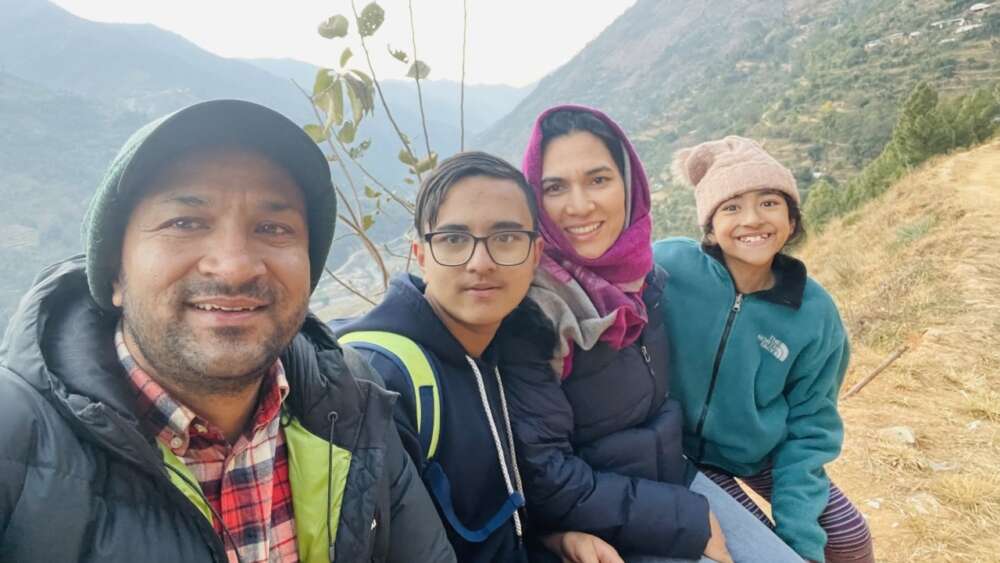Is this faith just for me or is it for others too?
When Logan Kunwar accepted Jesus as his Lord and King, overcoming deep cultural prejudice against Christianity, he asked himself, “Is this just for me or is it for others too?”
Logan had come to Sydney from Nepal in 2009 with a burning desire to help his family. He’d grown up in poverty in a mountain village called Arnakot Deurali in the country’s west.
“We had to walk two hours down the track to get a sack of rice or sugar,” he recalls of his childhood days.
“We’d be up at 4 o’clock in the morning collecting grass for our buffaloes and come back at 8 o’clock for a meal. And then after that, we’d get ready for school. The schools weren’t that close, so we’d have to walk for more than an hour to get there, down the hill and along the river. We’d get home about 5 o’clock, then collect firewood to cook food until it got dark and then we’d eat and do homework. We’d usually fall asleep while studying.”
So driven by a desire to create a better future, he’d left his wife two weeks after their wedding, after borrowing $18,000 from his elder brother in the expectation that he would get a job and send back money to the impoverished family.
But it was the height of the global financial crisis and Logan could not find a job leading him to become increasingly desperate.
“I was missing my family, missing my newly married wife – it was really hard,” he tells Eternity.
Feeling increasing pressure to repay his brother and worried about his wife Sita, who was pregnant and couldn’t afford to go to the hospital, Logan was brought to his lowest point. “I look back now and it’s like God was bringing me down to my lowest to humble me. I was the son of a Hindu and a very hardcore communist. Back then, I didn’t believe in any gods and goddesses,” he recalls.
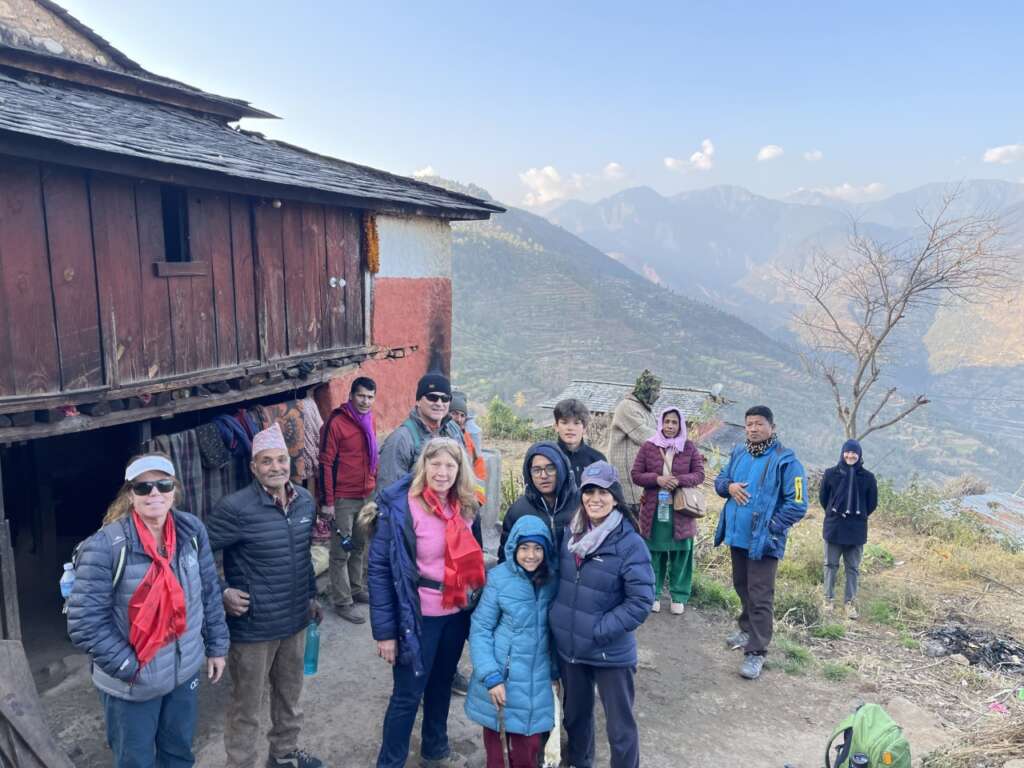
The January 2023 training team in front of Logan’s parents’ home in Arnakot Deurali, Nepal
Logan was so desperate that he even began to consider selling his organs to get money to pay back his brother.
“It was a really, really, really difficult situation, a very anxious time I went through. I just wanted to get money for my family and, without knowing anything, I prayed in my heart and I said, ‘Look, money is everything for my family. I will want even to sell my organs to give them money.’ But at the same time, I think God put in my heart a prayer and I even wrote it in my diary saying, ‘If there’s a true God behind everything, I want to know you before I do something silly to myself.’”
Logan believes God answered that prayer by putting him in touch with a missionary doctor in Adelaide, who connected him with a local minister called Campbell King, who was then the senior minister at St Paul’s Anglican Church in Canterbury, Sydney.
‘If there’s a true God behind everything, I want to know you before I do something silly to myself.’”
To Logan’s surprise, Campbell invited him and his three Nepalese friends to dinner.
“I got confused because I’m the son of a Hindu and in our religion, you don’t go to other religious people’s homes, but I said to myself, ‘What could possibly go wrong?’ So I went and had dinner with Campbell and his wife Marcia. A couple of days later, my landlord said he needed to vacate the hostel because he was in trouble with the council and I had no idea where I would go.”
In desperation, Logan called the only person he knew in Sydney, Campbell King, and asked him for help.
“He said, ‘OK, get your backpack ready. I’ll come and pick you up.’ So he picked me up and he put me, with my three Nepalese friends, at the back of the church hall. And I stayed with Campbell for five years. Those three other Nepalese moved out after a while once they got jobs. Then I started thinking about all these people in the church and how they love me. And I started wondering, ‘Is this the God I prayed to? If the true God was Allah, he could have sent me to a Muslim family. If he were Buddha, he would’ve sent me to a Buddhist family. Why Christians?’
“And then Campbell told me that ‘You tried all your gods and goddesses and you tried your communism and nothing seemed to be working for you. How about you have a go with the God of the Bible?’ And basically, that was it.”

From left, Tim Swan, Logan’s cousin, Logan, Donna and Mike Gunn, Dan and Prem Tamang from Kathmandu
As soon as Logan started reading the Bible, he found it made sense. It described a world very similar to the one he had come from. Reading the Bible was eye-opening for Logan “because the biblical culture and our culture are very similar. It was an agricultural culture and then it talks about sin a lot, and in our culture, they do the same. It’s family oriented in a more kind of communal society. So it’s very different from the Western world but
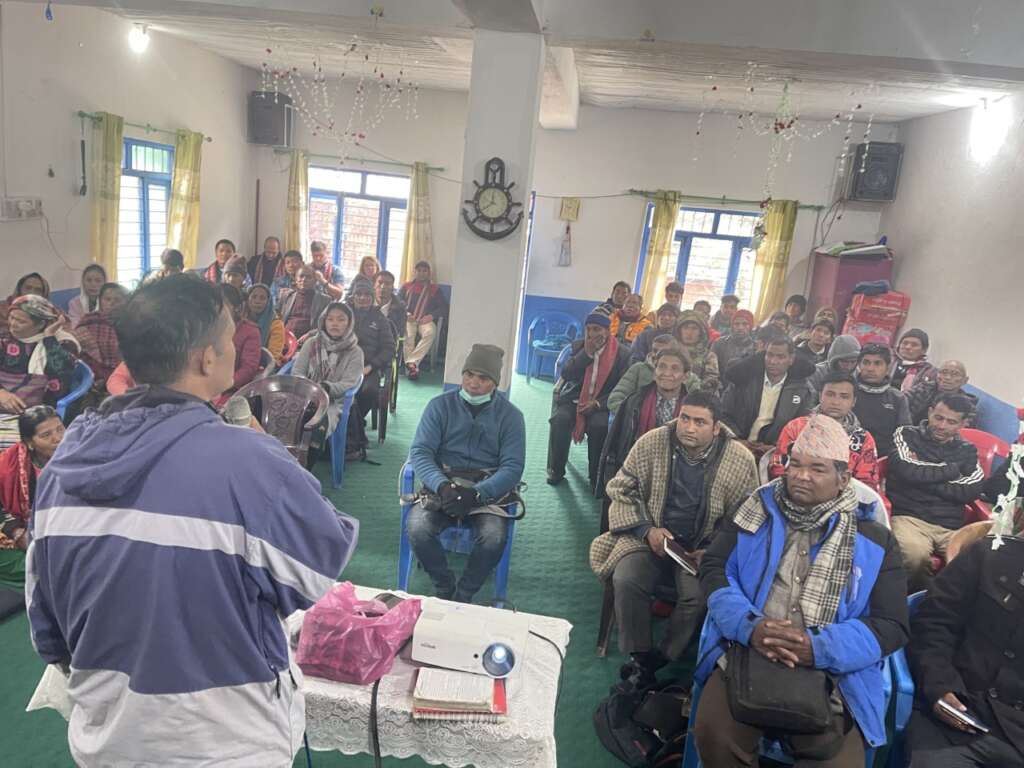
Teaching session in action with pastors
similar to our culture.
“Then one day Campbell said to me, ‘Maybe it’s time that God is calling you.’ So I asked Jesus to forgive me and be my Lord and my king, and things started changing from then. I got a job and had a bit of a cash flow to support my family back home. And for the next couple of years, I was actually studying and trying to work and build a new life and a new faith.”
His path was far from easy, though, as Logan battled dark forces that tried to prevent him from adopting his new faith.
“There were nights when the demons tried to suppress me not to come to Jesus. They would try anything. Sometimes they’ll push me down from my chest and I would fight to breathe. And sometimes in my dreams, they would not let me come inside the house. They’d try to take me out. Back home, there are a lot of dark forces. There are witch doctors and witches and lots of superstitions.
“So every time I had an attack, then I would just take Jesus’ name and ask them to get away from me and it would happen. Then when I came to know the truth, it was so liberating. A lot of people back there are living in darkness and it was so much freedom to live in the light, live with Jesus.”
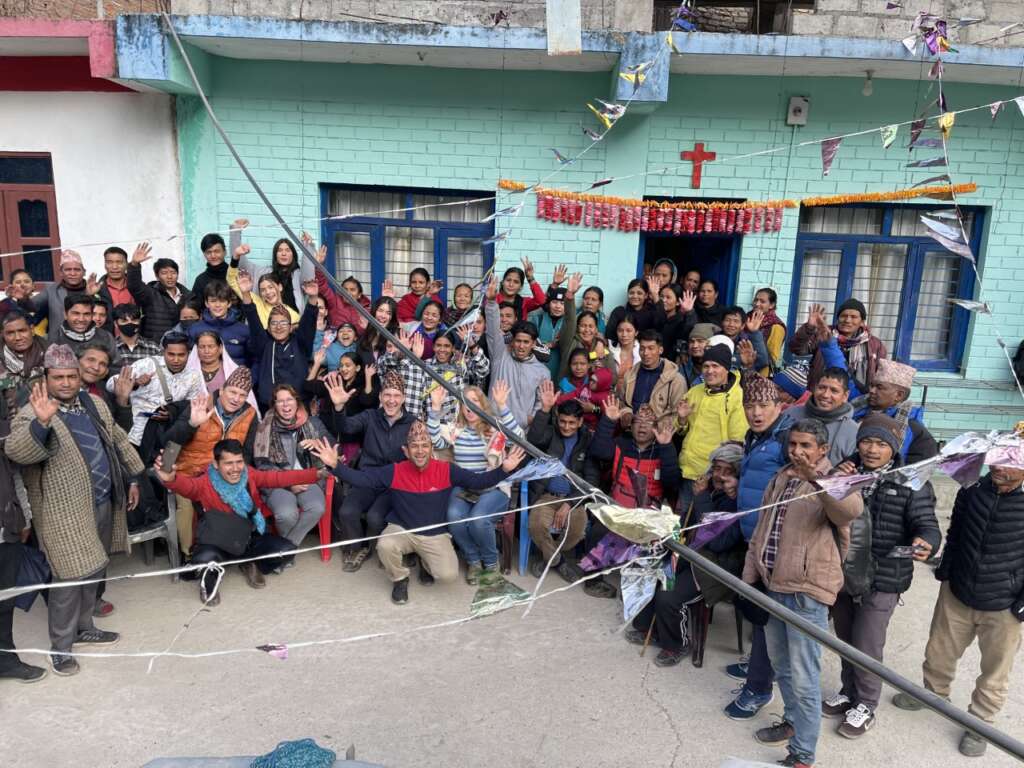
Group photo at the end of training
Logan’s wife couldn’t apply for a visa to come to Australia until after the birth of their first child. When their son was born with severe vision problems, she blamed Logan, thinking a Hindu goddess cursed the family after Logan became a Christian.
But her opinion changed when she arrived in Sydney and saw how much her husband had changed.
“When she came out here, she saw I was a different person. I was a more aggressive person before. I tried to do everything and taught myself, thinking I’m invincible. But once she came out here, I was much calmer and humbler. So she thought this is something better to pursue.”
Logan’s priorities also changed to the point that his life became focused on giving glory to God even as he worked to provide for his family. “That’s what I’ve been called for and I think that’s how that has changed me and impacted me to live my life in that way.”
It was soon after his wife turned to Christ that Logan began to wonder whether this faith was just for him or whether he should reach out to his family back home and to other Nepalese people. With a thankful heart, he realised he could act on his childhood wish to help his village by showing God’s love to family and friends and sharing with them the good news about Jesus.
“My family all believe in idols and they don’t know about God,” he explains.
So in 2014, Logan returned to Nepal with Campbell and Marcia King and did public preaching about Jesus in three villages – two years before the law was changed to outlaw public preaching.
“In my village, for a long time, there had not been many taps,” he says. “People would gather at the water pump there, like in Jesus’ day when people would gather at the water source – like in the story of the woman at the well.”

Logan’s family with his sister and family and Australian friends in Kushma near Pokhara
So while everyone gathered at the tap in the morning, the group would play the story of Jesus in Nepalese on a Saber (an MP3 player powered by a hand-winding mechanism rather than batteries). After that, Logan would get up and preach.
While there were many stories of God’s grace reaching people, Logan realised that this approach was limited in effectiveness because they were there for only a short time and could not follow up.
“At that time in my village, there were zero Christians. Then somehow, we got connected with a couple of pastors down in the valley and we started working with them, and we realised they need theological training, but they’d also like help with building and other things. We said we can work with them. And that’s what we did. We raised money from our church in Canterbury and some Christian friends from the Northern Beaches and we helped them to build a building and the church has grown now. They also started a new church now.
“Then Campbell and I went back end of 2016-17 to do some teaching. We did training for a week and we had about 40 people come and from that time we thought, ‘OK, so this is what we should pursue. We should train them so they can understand the Bible more. And they can go and talk to their people in a way that is more effective and they would understand far better. So that’s how the concept started.”
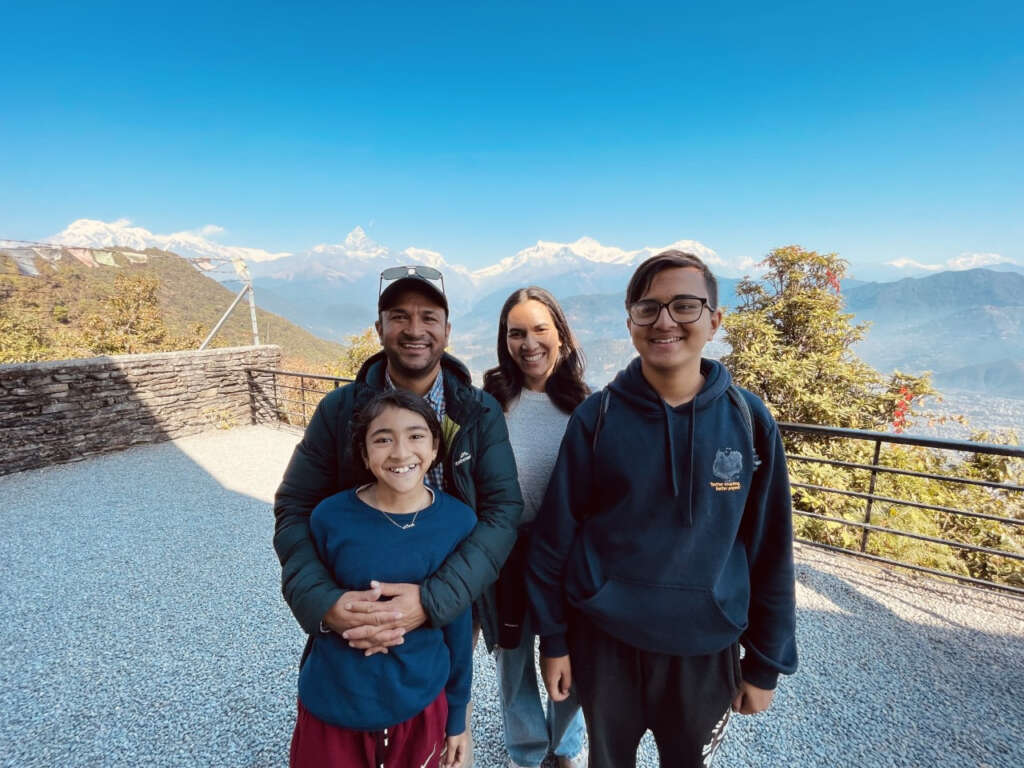
Logan’s family at the top of a mountain in Pokhara
This year in early January, Logan and a family from his church went on a mission to Burtibang, the trade centre for western Nepal close to Logan’s village. They organised theological training for 56 pastors, a third of whom were women.
A couple from the USA, Mike and Donna Gunn taught the biblical overview of how God’s story fits together and points to Jesus along with a segment on the book of Ephesians. The CEO of Anglican Aid, Tim Swan, who was visiting projects in Nepal, also helped run some training. Two Anglican leaders from Kathmandu helped us with the translation and ran a few training sessions in Nepali.
Logan says the church in Nepal is growing fast – the second fastest growing church next to Iran – but the theological education is lacking.
“These pastors are not theologically trained. They’ve gone overseas and somehow got converted, gone back to Nepal and started their own little churches in the valleys and the villages,” Logan explains.
“Some of them haven’t even finished their school level of education, let alone studied the Bible, so it is a big thing. Most of them don’t even understand how Bible fits together. They can’t afford to go city like Kathmandu and Pokhara to get trained as they run their farm/business and family along with the church. They don’t get paid from their church and there is no external support.
“Most Nepalese pastors don’t teach through the Bible. They don’t even prepare the sermons. They would open the Bible and talk about moralism, but unless God’s word is working in people’s hearts, they won’t change.”
On this latest trip, Logan tried to create a partnership with Mike Gunn, Anglican Aid, the Anglican Church in Kathmandu and the Church in Burtibang, so that he doesn’t have to go to Nepal every time they hold training.
One of his dearest hopes is that his family will hear the gospel and turn to Christ.
“In the beginning, when I told them I became Christian, they said, ‘you’re no longer part of our family anymore. You rejected our religion and culture and are no longer part of our family. But that’s not the case now. They accept us, but they don’t accept what we believe and instead believe that we have been brainwashed.
“But if we go and train these pastors, somehow, they will spread the gospel in that area. And then, hopefully, one day, my family will start hearing the gospel and God will change their hearts.”
Logan has created a WhatsApp group for people to pray for Nepal, which is suffering from a brain drain of talented people leaving the country and the church is not exempt from this trend. If you would like to join the group or would like to know more about the church in western Nepal, you can contact Logan at 0413228321.
Email This Story
Why not send this to a friend?
